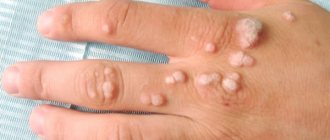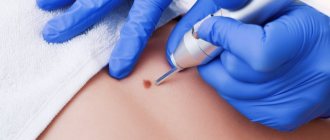What is lipoma? Why do lipomas occur? Indications for removal
Lipoma primarily consists of adipose tissue and occurs on any part of the body in places where the skin is least dense. Most complaints about a neoplasm come from patients over 30 years of age, but a lump can appear at any age, regardless of gender and ethnic group.
The tumor can grow, sometimes the lump reaches an impressive size. It is soft to the touch and moves easily under the skin. Does not cause pain.
The reasons for the appearance of lipoma have not yet been clarified, but many experts believe that the growth occurs due to a metabolic failure, especially when the process of fat breakdown is disrupted. This theory is confirmed by the fact that when a person’s weight fluctuates, the lipoma grows.
Other versions of wen formation:
- clogging of the duct of the sebaceous glands;
- problems with the liver and gastrointestinal tract;
- avitaminosis;
- metabolic disease;
- high cholesterol in the blood;
- endocrine disorders;
- slow thyroid function;
- high blood sugar;
- upper respiratory tract diseases;
- smoking and alcohol abuse;
- genetic predisposition.
The risk group for lipoma also includes people who lead a sedentary lifestyle. Due to insufficient physical activity, muscles lose tone, less oxygen enters the blood, the gastrointestinal tract functions worse, and, as a result, toxins are eliminated from the body more slowly.
Lipoma is removed in the following cases:
- there is a risk of a harmless lump developing into a malignant tumor;
- lipoma affects neighboring tissues;
- the wen has appeared in the peritoneum and affects the functioning of internal organs;
- spoils the patient's appearance.
The growth is most often removed surgically, after which sutures are placed on the operated area.
Actions after surgery
Immediately after the lipoma removal process is completed, it is important to send the removed contents for histological examination to determine whether the tumor was malignant. To avoid infection in the wound, you need to wear a bandage or bandage for several days. It is worth wiping the area where the lipoma was daily with alcohol or substances that contain it. The body should not be exposed to great physical stress. This can cause bleeding from a newly healed wound, infection, and suppuration.
If, after surgery, fluid or blood collects in the cavity that has formed, you need to inform the doctor, who will install a drainage to drain this fluid. Otherwise, inflammation may begin. The inflammatory process is usually accompanied by an increase in temperature. Therefore, if it rises and lasts for a long time (more than one day) or is too high (more than 37.5), then you need to go to the hospital. They will prescribe appropriate medications and also eliminate the cause of inflammation.
When the wound heals with scarring, a doctor’s consultation is also necessary. He will recommend special ointments and physical procedures that will help avoid scars after surgery.
How to prevent the reappearance of wen
It’s very good when the operation was successful and you can move on with your life. But, unfortunately, not everything is so simple. After all, a lipoma does not appear just like that; it is facilitated by certain factors, under the influence of which a lipoma after surgery can appear in that same place or in some other place. To prevent this you need to:
• Balance your diet in order to improve your metabolism. It is important to eat less animal fats, fried foods, mayonnaise, sauces, sweets, and baked goods. The diet should consist of raw and boiled vegetables and fruits, fermented milk products, seaweed, fish, and cereals.
• It is important to monitor hormonal levels, normal functioning of the thyroid gland and adrenal glands. To do this, you need to undergo a medical examination in a timely manner, at least once a year. Again, eat healthy food, especially seafood, greens, and walnuts. It is better to use iodized salt for cooking.
The production of hormones in the required quantities is negatively affected by stress, lack of sleep, excessive physical activity and, conversely, a sedentary life.
• Frequent fluctuations in body weight also provoke the growth of wen. This can happen either due to hormonal imbalances or due to frequent experiments with diets, during which the body loses large amounts of fat tissue. But as soon as the diet ends and a person allows himself too much, adipose tissue grows, the body does not have time to react to this in time, and some particles of fat end up in ways through which it is difficult for them to get out - lipomas are formed.
• Women must remember one important thing, beauty is something given by nature, it should be natural. Often girls, trying to change their appearance for the better, suffer from this. Thus, when installing silicone implants in the breast, adipose tissue may react ambiguously to a foreign body, as a result of which lipomas sometimes appear.
• It is important to carefully monitor personal hygiene, as clogged pores can prevent the release of fat through the skin. Sometimes it is useful to take a contrast shower, which allows you to cleanse the skin well. A sauna and bathhouse, as well as a hot bath, do a good job of cleaning.
• Decreased immunity can provoke the development of many diseases, including skin diseases, which sometimes cause the growth of wen. To support immunity, it is important to monitor healthy intestinal microflora, as well as maintain a clean mouth to prevent throat diseases. It is important to consume enough vitamins C and E and spend time in the fresh air. During periods when the immune system is particularly weak (winter and spring; experiencing severe emotional turmoil; adaptation after surgery or a serious illness), it is necessary to resort to the use of immunostimulants.
As you can see, to prevent lipoma from appearing again after surgery, it is important to slightly rearrange your rules of life and monitor your health and well-being.
Depending on the location, a fatty tumor can be of two types: under the skin - then it is called a lipoma; and inside the skin - then it is atheroma. The substance of both types of neoplasms consists of fat cells.
Medical methods for lipoma removal
Small lipomas can be removed with chemical peeling, but large growths should be addressed by a doctor. The fact is that lipoma is similar in appearance to a number of other diseases, and the contents of the wen are subject to histological examination.
Several methods are used to get rid of lipoma:
- Endoscopic excision . The contents of the wen are removed through a small puncture.
- Medication method . An absorbable drug is injected into the wen. The process may take several months, but there are no scars left after the procedure.
- Laser removal . Traces after the procedure become barely noticeable over time.
- Surgical excision . A longitudinal incision is made and the fatty deposit is removed along with the capsule in which it is contained. After the operation there will definitely be a scar. This method is prescribed for large lipomas.
How long does it take for sutures to be removed?
During the first days, if the patient is in the hospital, the stitches are observed by the medical staff. To do this, the edges of the wound are treated with brilliant green and peroxide. It is not advisable to use iodine for such purposes due to the risk of an allergic reaction. The gauze bandage is changed regularly, as ichor is still oozing from the wound. It is not recommended to wet the affected area. As a rule, this period lasts up to 5 days.
READ ALSO: Growths on the skin. Description and photo of neoplasms.
If healing proceeds without complications, the bandage is removed. The treated wound is left to “dry”. A person is allowed to wash, but not touch the scar site. After the water procedure, the wound should be blotted with soft gauze and then treated with an antiseptic. This is the most crucial period. Infection must not be allowed to enter open tissue. Otherwise, swelling and inflammation will begin, and as a result, suppuration will begin, and the wound will have to be cleaned.
The sutures are removed 1 to 2 weeks after surgery. The use of antiseptics does not stop, but is reduced. For speedy healing, special ointments may be prescribed. As a rule, after some time the patient needs to see a surgeon for an examination after removing the threads.
Possible complications
Complications after removal of a growth are quite rare. After removal of large lipomas, a cavity may remain where blood is located. To avoid such a nuisance, install a special drainage and make a tight bandage.
Also, after the operation, the temperature may increase - if it lasts for several days and is not relieved by any medications, swelling and pain appear - you should consult a doctor.
To avoid complications, it is recommended to follow some tips for caring for a postoperative wound:
- change the bandage regularly - dirty bandages can cause infection, inflammation and, as a result, the formation of new unpleasant growths;
- wash your hands before contacting the operated area;
- be sure to wash the wound with antiseptics;
- avoid direct contact of the wound with clothing, linen and other irritating factors;
- use only those medications prescribed by your doctor;
- Refrain from taking hot baths and visiting the sauna/swimming pool for several days.
After the operation, a suture is placed on the wound. If the rehabilitation period went well, then after 1–2 weeks the suture is removed. But it also happens that the patient did not follow the recommendations for wound care or for some other reason complications arose in the form of seals.
The appearance of “bumps” may mean:
- if the lump does not hurt, it is possible that it is just a knot from the thread that was used to stitch the edges of the wound - it will soon resolve on its own;
- the lipoma was deep enough and the wound was sutured in several layers: the seal was the lower seam;
- due to the accumulation of lymphatic fluid, a seroma has appeared - the main thing is to follow the doctor’s recommendations and not cause an infection;
- fistula is the most dangerous type of compaction; if there is discharge of pus and discomfort, consult a doctor immediately;
- hypertrophic or keloid scar - recognized by its characteristic bumpy red surface - a cosmetic defect that should be gotten rid of as soon as the wound has completely healed.
What to do to avoid falling apart
To avoid suture dehiscence, a person must adhere to the doctor’s advice. Most often, this happens if a person does not take the recovery process seriously, ignoring instructions and recommendations.
If the scars are in the abdominal area, it is forbidden to lift any heavy objects for some time. However, it is better to completely abandon physical activity during the rehabilitation period.
In the first days after removal, it is better to lead a passive lifestyle as much as possible. Lie down and rest more. You should avoid visiting the bathhouse, sauna, or swimming pool.
In this matter, a lot depends on the operating doctor himself. It is necessary that during the operation all norms are observed. For example, it is important that during suturing, the doctor pays attention to the tension of the skin. The smaller it is, the greater the likelihood of successful healing. The doctor must treat tissues with care. To prevent the seam from coming apart, only high-quality threads should be used for stitching. You should also not forget about the use of antiseptic drugs and the hygiene of dressings.
If everything is done correctly, the risk of skin rupture is quite minimal.
Scar formation
The appearance of a scar after removal of a wen in itself is a natural process. After some time, the scar should disappear on its own, however, if an infection joins the wound during treatment, the scar can turn into a pathological one - represented by excess collagen and hyaluronic acid. As a rule, after surgery, atrophic, hypertrophic or keloid scars are formed; they require mandatory correction.
Atrophic scars , also known as pockmarks or potholes, are depressions in the skin, located below the skin level. They occur when there is a deficiency in the production of collagen and elastin - the building materials of epidermal cells. In such scars, pigmentation is impaired, so they cannot be hidden under a tan.
Hypertrophic scars , on the contrary, protrude above the level of healthy skin texture. They also have impaired collagen production, but in this case the body produces it in excess. Due to the pressure of collagen fibers on the blood vessels, the scar changes color from red to purple.
A keloid scar is similar in appearance to a hypertrophic scar, but does not have its characteristic properties; the keloid grows over time and invades adjacent areas of healthy skin. Causes itching, burning, and a feeling of tightness. The most difficult to treat.
In order not to aggravate the situation, any scar (especially keloid) must be corrected as soon as it is diagnosed and the operated area has completely healed.
Precautionary methods and means of treatment
In order to prevent complications and the stitches from coming apart, a person should understand that treating a wound is a responsible and necessary process. There is no need to think “if I remove the stitches, then there is no need to care for the wound.” The longer this happens, the lower the risk of developing dangerous consequences.
For disinfection and restoration, you should use brilliant green, peroxide, alcohol, a solution of furatsilin or potassium permanganate. You can smear the wounds with Levomikol, Bepanten, Contractubex.
The article has been verified by the editors
After surgery to excise the lipoma, the material is sent by the doctor for histological analysis. Afterwards, the patient must follow the doctor’s recommendations and constantly wear a disinfectant patch at the wound site. It will prevent bacteria from entering the treated wound.
Possible methods of dealing with scars
A scar after a wen can be removed using cosmetic procedures, physiotherapy, applications with anti-scar agents and through surgery (scar excision).
Cosmetology can offer various peelings, dermabrasion and ozone therapy. Each method involves one way or another damaging the stratum corneum of the skin, which implies a rehabilitation period, pain during the procedure and a certain course of procedures. The main contraindications are pregnancy and lactation.
Surgical intervention is performed in extreme cases - when the scar has grown to enormous sizes and conservative methods do not “take” it. Excision not only means a second operation with a suture, but sometimes the formation of a second, rougher scar.
Applications of various anti-scar creams and ointments are effective on fresh and small scars, and also as an additional treatment during physiotherapy.
Physiotherapy fights scars and lipoma scars without damaging the stratum corneum of the skin. It involves exposing the damaged area to electric current or ultrasound. The procedures are painless, atraumatic, and you can feel a pleasant tingling sensation. Current or ultrasound transports particles of a substance (solution, cream or ointment) into the deep layers of the dermis, significantly accelerating the process of skin regeneration (renewal). In addition, metabolic processes are stimulated in the body, blood circulation improves, drug depot accumulates, and deformed collagen fibers are broken down.











